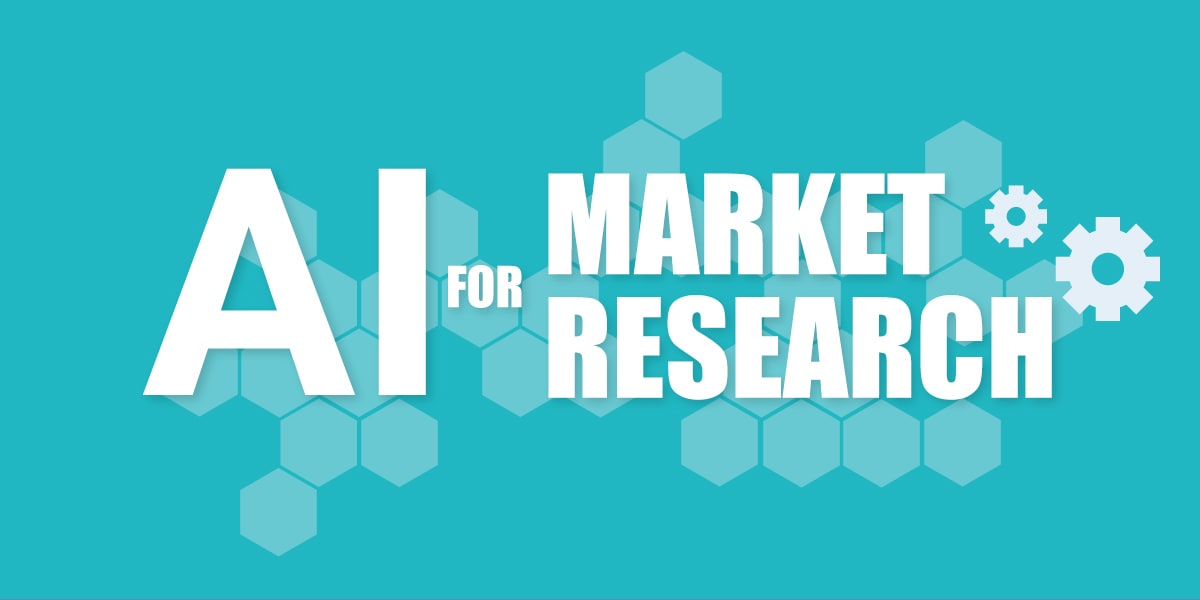How Small Businesses Can Use AI for Market Research
Market research should already be an important part of any small business’s workflow; however, using AI tools can help reduce this time-consuming and often expensive task.
Traditional market research methods liks conducting surveys, analyzing sales data, or studying consumer behavior can tie up valuable resources and in turen be costly.
With the emergence of artificial intelligence (AI), which is a technology that allows machines to learn from data and perform tasks that typically require humans, small businesses now have access to powerful tools for conducting market research efficiently and affordably.
AI-powered solutions allow companies to gather real-time insights, identify trends, and make data-driven decisions, all of which are essential for competing effectively in a rapidly changing market. In this guide, we’ll explore how small businesses can use AI for market research to gain a competitive edge.

Why Market Research Matters for Small Businesses
Market research involves gathering and evaluating data about your target market, consumers and competitors to help provide data-driven insights that can have an impact on business decisions.
It’s essential for understanding customer needs, industry trends, and opportunities for growth. Small businesses that invest in market research can see the difference between launching successful products and struggling to attract customers.
With the aid of AI-based software, small businesses can now democratize their market research efforts and uncover valuable insights that were once only accessible to larger companies, making them feel more included and competitive in the market.
Benefits of Using AI for Market Research/h2>1. Faster Data Collection and Analysis
AIs have the ability to process large volumes of data faster than any human ever could.
This speed of processing provides significant relief on human resources within your business, allowing you to analyze information in real time.
Instead of manually reviewing customer feedback, social media mentions, or survey responses, AI tools can analyze this data instantly, enabling small businesses to make quicker, more informed decisions.
2. Identifying Market Trends and Patterns
AI-powered tools can detect emerging trends by analyzing data from a variety of sources, such as blog posts, news articles, social media platforms, and forums like Reddit.
AI uses natural language processing (NLP) to understand customer sentiment, helping small businesses identify shifts in consumer preferences and potential market gaps.
3. Predicting Customer Behaviour
AI uses predictive analytics to anticipate customer behaviour based on historical data. By analyzing past purchase behaviours, website interactions, and customer demographics, AI can help small businesses understand what their customers are likely to buy when they’re most likely to purchase, and what factors drive their decisions.
4. Competitor Analysis
Staying informed about competitors is essential for a small business looking to secure themselves in their target market.
AI tools can help to track your competitors’ activities, including changes in pricing, product offerings, and marketing strategies. Identifying where you can improve and adapt your strategy can increase sales, profit margins and brand loyalty.
5. Cost Efficiency
AI-driven market research tools allow small businesses to conduct comprehensive research without the high costs associated with traditional methods. For small businesses with limited budgets, AI offers a cost-effective way to gather market intelligence and stay competitive.
How Small Businesses Can Use AI for Market Research
1. Social Media Listening and Sentiment Analysis
Social media platforms are a goldmine for customer insights. AI-driven tools like Brandwatch and Hootsuite Insights allow businesses to monitor brand mentions, customer feedback, and trending topics.
Sentiment analysis is an AI feature that identifies positive, negative, or neutral emotions in social media comments. It helps to give valuable insights into how customers perceive your brand. The data can help small businesses understand what their customers’ need, improve their products, and develop effective marketing strategies.

2. Customer Surveys with AI-Driven Analysis
Customer surveys are a direct way to gather feedback, but analyzing responses can be time-consuming. AI-powered survey tools like SurveyMonkey and Typeform use smart automation tools to analyze survey responses, identify key themes, and provide valuable feedback.
Survey tools with AI in them allow you to tailor follow-up questions based on previous answers, making surveys feel relevant to those taking part.
3. Competitor Analysis Using AI Tools
Tools like SimilarWeb use AI to provide insights into competitor activity. They allow small businesses to track competitors’ marketing efforts, audience demographics, and engagement levels. By understanding what works well for competitors, small companies can refine their strategies to differentiate themselves in the market.
4. Predictive Analytics for Customer Behaviour
Predictive analytics tools, such as HubSpot and Salesforce Einstein, use AI to forecast customer behaviour and trends.
By analyzing historical data, these tools can help businesses anticipate future demands, allowing them to tailor their products and marketing campaigns accordingly. Predictive analytics is especially useful for small businesses looking to improve customer retention by delivering personalized experiences.

5. AI-Powered Trend Analysis
Keeping up with your business’s industry trends can be challenging for small businesses with limited resources. AI tools like Trendalytics help to analyze current trends, popular topics, and industry reports.
With these types of AI tools, small businesses can identify emerging trends in their industry, helping them adapt their content and marketing to market demands.
6. AI-Driven Competitive Pricing Analysis
For small businesses, competitive pricing can be crucial. AI-powered pricing tools like Price2Spy allow companies to track competitors’ prices in real-time. These types of tools help determine the best price to sell your products, helping you stay competitive while maintaining a healthy profit margin, much like supermarkets do.
7. Content Optimization with AI
Artificial Intelligence tools can analyze market research data to identify content trends and preferences. Platforms like Frase and Clearscope use AI to help businesses create content that resonates with their audience. By analyzing popular topics, keywords, and search queries, small businesses can optimize their content strategy to attract and engage customers more effectively.
8. Image Recognition for Product Analysis
AI-powered image recognition tools like Google Vision AI can analyze visual content for market research purposes. These tools allow businesses to understand product trends by analyzing social media images, customer photos, and brand visuals. For example, small businesses can use image recognition to track how their products are used or to identify customer preferences for particular design styles.
Getting Started with AI for Market Research
Starting with AI for market research doesn’t have to be overwhelming. Begin by identifying the areas of research in which you want your business to improve. That could be getting a better understanding of customer preferences, tracking competitors, or optimizing pricing.
Once your objectives are clear, choose a few AI-powered tools that fit your needs and budget. Take advantage of free trials, allowing you to explore their features before committing.
AI-driven market research can help small businesses compete with larger companies that have more resources. Simply adopting a few key AI tools can give small businesses actionable insights, help them adapt quickly to market changes, and build stronger connections with their customers, setting the foundation for sustainable growth.
Whether you’re just starting or looking to scale, AI-powered market research can be a game-changer in understanding your target audience and achieving business success.




